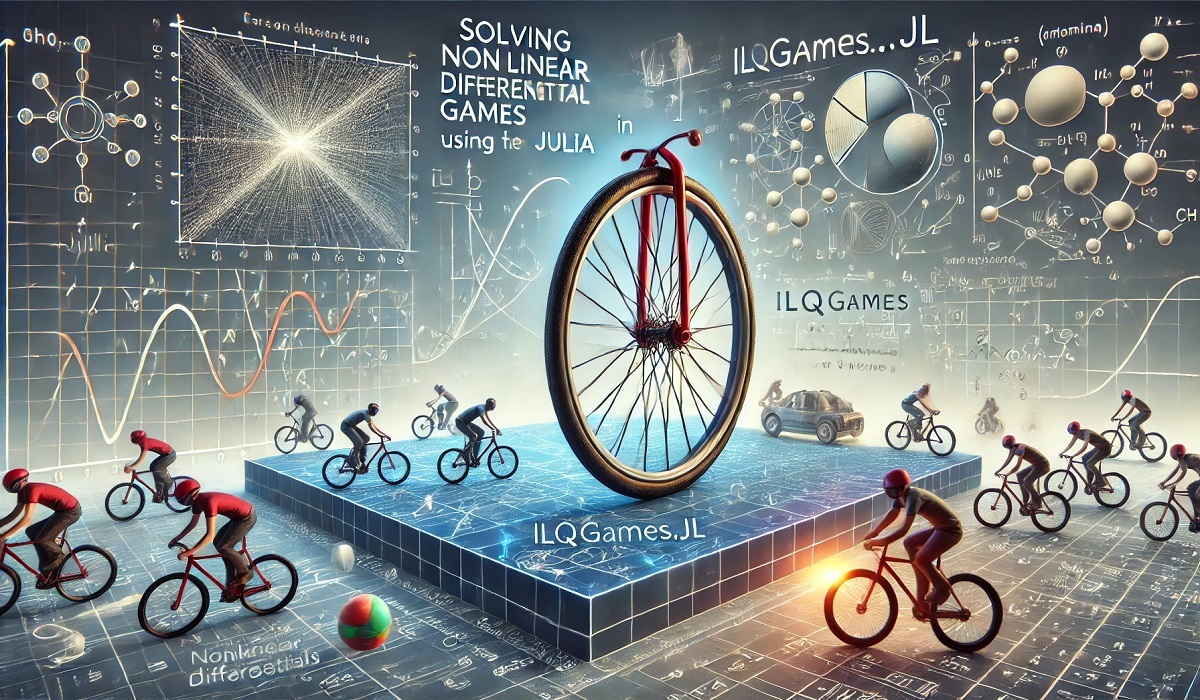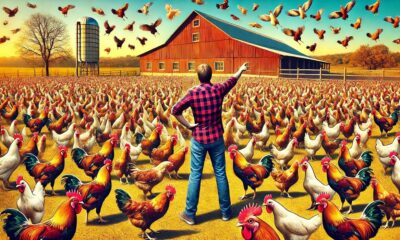GAMES
ilqgames.jl: Solving Nonlinear Differential Games in Julia

In the fast-paced world of game theory, particularly in scenarios involving multiple agents with competing interests, finding optimal strategies can be an overwhelming challenge. However, tools like ilqgames. Jl has simplified this complex task. Developed for use within the Julia programming environment, ilqgames.jl is a cutting-edge framework that rapidly designs and solves nonlinear general-sum differential games. By relying on iterative linear-quadratic (iLQ) game approximations, this package enables users to model, solve, and visualize dynamic systems involving multiple decision-makers. This article will delve into the core features, installation process, and real-world applications of ilqgames. Jl, as well as explore the key concepts behind it.
What is ilqgames.jl?
ilqgames.jl is a specialized package designed for the rapid design and solution of nonlinear general-sum differential games. In these games, multiple agents interact in real time, and their strategies depend on the actions of others. ilqgames.jl uses iterative linear-quadratic (iLQ) approximations to efficiently solve for non-cooperative Nash equilibria, where each player seeks to optimize their outcome without cooperation. This framework leverages Julia’s powerful performance, particularly in scientific computing, to model complex systems with multiple agents in real time.
Key Features of ilqgames.jl
- Nonlinear Game Solving: Can handle nonlinear differential games, making it ideal for real-world systems where linearity cannot always be assumed.
- Iterative Linear-Quadratic Approximation: This method uses an iterative approach to approximate the system’s dynamics and solve the game. This leads to efficient computation and practical implementation.
- Real-Time Performance: The performance is optimized for real-time applications, making it suitable for dynamic environments where decisions must be made quickly.
- Integration with Julia’s Ecosystem: Fully compatible with other Julia packages, such as ParticleFilters.jl, to incorporate uncertainty modeling and enhance game-solving capabilities.
How Does ilqgames? Jl Work?
Understanding the Core of the Framework
At the heart of ilqgames.jl lies the concept of differential games, which are a natural fit for modeling problems in robotics, economics, and military strategy. In these games, the state of the system evolves, influenced by both the environment and the actions of various agents. The framework uses a mathematical formulation that represents the system dynamics, cost functions, and constraints, solving them iteratively through linear-quadratic methods.
1. Dynamics Definition
The system’s dynamics are typically expressed using differential equations. In ilqgames.jl, these are represented as control systems, and users can define their models based on specific problems, such as unicycle dynamics, which describe the movement of a vehicle in two-dimensional space.
2. Cost Functions Setup
Each player in a differential game aims to minimize or maximize a cost function that depends on both the state of the system and their control inputs. ilqgames.jl allows users to set up these cost functions either by using predefined functions or by creating custom ones, providing flexibility for various types of games .
3. Solving the Game
Once the dynamics and cost functions are defined, ilqgames.jl uses the iLQSolver to compute the optimal strategies for each player. The solver iterates through the game’s timeline, optimizing each player’s actions based on the current state of the system and their objectives. It is capable of handling general-sum games, where the players’ payoffs are interdependent .
Installation of ilqgames.jl
Installing in Julia
To begin using ilqgames.jl, you need to install it in your Julia environment. This can be done easily through Julia’s package manager:
- Open the Julia REPL (Read-Eval-Print Loop).
- Enter the following commands:
This will download and install the necessary files for the framework to run on your system. Once installed, you can start using the framework immediately for modeling and solving games Lasse Peters.
Applications of ilqgames.jl
1. Multi-Agent Systems
In robotics and autonomous vehicles, multiple agents (robots or cars, for example) often need to make decisions simultaneously while taking into account the actions of others. ilqgames. Jl can model these scenarios, ensuring that each agent optimizes its path while avoiding collisions and achieving its specific goal. One such example is a multi-player collision avoidance problem, where each robot is modeled as a system that avoids obstacles while striving to reach a target GitHub, Lasse Peters.
2. Economic Modeling
Economic systems can be represented as games, where each player (firm, government, or consumer) makes decisions that impact the market. ilqgames. Jl can be applied to study such systems, especially when multiple agents interact dynamically, like in market competition models or resource allocation games.
3. Military Strategy Simulations
Military strategies often involve multi-agent interaction, where each participant’s actions influence the others’ decisions. By simulating scenarios like battlefield strategies or weapon deployment, ilqgames.jl helps in finding optimal strategies under complex dynamics, assisting military planners in understanding game-theoretic models for conflict resolution Julia Packages GitHub.
Example Use Case: Two-Player Unicycle Game
To illustrate how ilqgames.jl functions, consider a simple scenario with two players, each controlling a unicycle. The first player controls the steering, and the second player controls the acceleration. The goal of player-1 is to stay close to the origin, while player-2 attempts to maintain a constant speed of 1 m/s.
Step-by-Step Setup:
- Define the Dynamics: The unicycle dynamics are defined using a control system, with the differential equation capturing the system’s behavior.
- Setup Costs: Each player’s cost function is defined to reflect their respective goals, such as staying close to the origin or maintaining a constant speed.
- Solve the Game: The iLQSolver is used to compute the optimal strategies for both players over a given time horizon. The results provide insights into how each player should act to achieve their objectives GitHub.
Performance Evaluation
The performance of ilqgames. Jl has been evaluated through several benchmarks, showing that it performs well even when compared to C++ implementations. It excels in real-time applications, and its use of automatic differentiation allows for quick adjustments to system dynamics without requiring manual derivatives. This efficiency makes it ideal for use cases requiring rapid decision-making, such as autonomous driving or real-time strategy games ar5iv.
Conclusion
ilqgames.jl represents a significant step forward in the world of differential game theory. By combining the power of Julia’s scientific programming capabilities with an intuitive interface for defining and solving nonlinear games, this framework provides a robust tool for researchers and practitioners alike. Whether applied to robotics, economics, or military simulations, ilqgames. Jl is well-suited for tackling complex, multi-agent decision-making problems, offering flexibility, performance, and ease of use. With real-time performance optimization, integration with Julia’s ecosystem, and the ability to solve even highly nonlinear problems, ilqgames .jl is poised to be a key tool in the study and application of differential games.
FAQs
What is ilqgames.jl?
ilqgames.jl is a Julia framework designed to rapidly design and solve nonlinear general-sum differential games using iterative linear-quadratic approximations.
How does ilqgames.jl differ from other game-theory solvers?
Unlike many solvers, ilqgames.jl can efficiently solve nonlinear differential games and integrates seamlessly with Julia’s ecosystem, offering rapid execution times.
Can ilqgames.jl be used for multi-agent systems?
Yes, it is particularly well-suited for modeling and solving problems in multi-agent systems, such as robotics and autonomous vehicles.
Is ilqgames.jl suitable for real-time applications?
Yes, its performance has been optimized for real-time problem-solving, making it ideal for dynamic, time-sensitive scenarios.
What types of problems can be modeled with ilqgames.jl?
It can model a wide range of problems, from robotics and collision avoidance to economic modeling and military strategy.
Is ilqgames.jl easy to integrate with other Julia packages?
Yes, it is highly compatible with other Julia packages, such as ParticleFilters.jl, for enhanced modeling capabilities.
How can I get started with ilqgames.jl?
Simply install the package in Julia using the package manager and start defining your game dynamics and cost functions.

 BUSINESS8 months ago
BUSINESS8 months agoService Top: Understanding Role, Dynamics, and Consent in Relationships

 TECHNOLOGY7 months ago
TECHNOLOGY7 months agoSSIS 858: Everything You Need to Know

 GUIDE6 months ago
GUIDE6 months agoLookmovie2.to Legit: A Detailed Review of Safety and Features

 FASHION8 months ago
FASHION8 months agoDIY Tips to Customize Your Orange Prom Dress and Stand Out

 GUIDE7 months ago
GUIDE7 months agoTokybook: Your Gateway to the World of Audiobooks

 TECHNOLOGY7 months ago
TECHNOLOGY7 months agoUnderstanding Libgen: The Ultimate Free Ebook Library

 GUIDE8 months ago
GUIDE8 months agoLeague of Graphs: The Ultimate Guide to League of Legends Stats and Analysis

 GUIDE7 months ago
GUIDE7 months agoLook at All Those Chickens: The Story Behind the Viral Meme
















